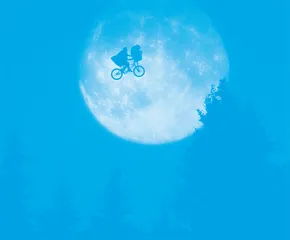ET the Extra-Terrestrial at 40《E. T.外星人》40年
作者: 斯科特·托比亚斯 商裴裴/译

Spielberg’s lauded 1982 hit is about childhood empathy—four decades later, it’s still one of his most complete experiences. 1982年,斯皮尔伯格出品了一部备受赞誉的电影,轰动一时。影片讲述了一个关于孩子同情心的故事。时隔40年,这部电影依然是斯皮尔伯格最完美的经历之一。
There’s a crucial domestic scene early in ET the Extra-Terrestrial where 10-year-old Elliott (Henry Thomas) is trying desperately to convince his mother (Dee Wallace), his older brother Michael (Robert MacNaughton) and his little sister Gertie (Drew Barrymore) that he’s found an alien in the back yard of their suburban home. Nobody believes him. So he lashes out, like many children would in that situation. He claims his absent father would have believed him. And he tells his harried mother, who’s still raw from the divorce, that his dad and a woman named Sally are vacationing in Mexico. It hurts her feelings. Michael snaps at Elliott. “Why don’t you grow up? Think about other people for a change.”
《E.T.外星人》开场没多久,就有一场重要的家庭戏:10岁的埃利奥特(亨利·托马斯饰)竭力想让妈妈(迪伊·华莱士饰)、哥哥迈克尔(罗伯特·麦克诺顿饰)和妹妹格蒂(德鲁·巴里莫尔饰)相信他在郊外家里的后院发现了一个外星人。没人相信他的话。就像很多孩子遇到这种情况时表现的一样,他大发脾气。他说,爸爸要在的话一定会相信他。他还对焦头烂额的妈妈说,爸爸正和一个名叫萨莉的女人在墨西哥度假。埃利奥特的妈妈因为离婚饱经折磨,至今创痛未愈,这番话伤了她的心。迈克尔生气地冲埃利奥特说:“你怎么这么不懂事?改改吧你,为别人着想一下。”
Thinking about others is what ET is about. And that’s why it’s been extracting tears from audiences so effectively for 40 years. A child of divorce himself, Spielberg is uniquely perceptive about how kids are sensitive, vulnerable, innocent creatures who feel the world intensely, but are also naturally solipsistic. They understand how events affect them, but empathy is a learned trait, part of the same slow developmental process that teaches them to walk and read and fend for themselves. (Many adults fail to learn it.) Spielberg conceived a science-fiction fantasy where a boy literally feels what another being feels, and the bond between them is overwhelmingly powerful. Elliott grows up at a breathlessly accelerated rate.
为别人着想,这正是《E. T.外星人》的主题,也是为什么40年来这部电影赚足了观众的泪水。小孩子是敏感、脆弱、天真无邪的,他们热情洋溢地感受着这个世界,却又天生以自我为中心,对此,再没有谁能比自幼父母离异的斯皮尔伯格更清楚了。小孩子知道一件事对他们会产生怎样的影响,但是同情心是一种后天习得的品质,它和走路、读书、独自生活一样,都需要慢慢学习。(很多大人也没能学会。)斯皮尔伯格构思的这部科幻作品中,小男孩真的能感应到另一个生命的感受,他们之间有着无比强烈的联系。埃利奥特成长了许多,速度令人惊叹。
The storybook simplicity of the film is key. For that, Spielberg commissioned Melissa Mathison, who’d previously written The Black Stallion, another spare children’s drama about the connection between a little boy and an orphaned creature. Mathison’s script is a model of economy and clarity, pared down to serve a story that really has no big twists and turns: Elliott meets ET, an alien lost in the woods after his spaceship leaves without him. Elliott and his siblings then shelter the alien and help it get back home again. Outside of the scary, faceless adults who eventually intervene, that’s all there is to it. Even the dialogue, though whimsical at times, puts a premium on directness. A few of the most quotable lines: “Beeeeee good.” “ET phone home.” “Ouch.” “Stay.”
这部电影有如故事书般简单易懂,这一点至关重要。为此,斯皮尔伯格请来了梅利莎·马西森。马西森之前写了另一部儿童剧《黑神驹》,剧中一个小男孩和一匹失群的野马建立了感情。她的剧本可谓简明扼要的典范,故事被她精简到没有大的跌宕起伏:外星人E. T.没赶上宇宙飞船,在森林里迷了路,碰上埃利奥特。埃利奥特和哥哥妹妹给它住的地方,帮它重返家园。除了最后有一帮惊恐万状的各路大人出来阻挠,其他就没什么了。即便对话,也是直来直去的语言占了很大分量,只是偶尔让人摸不着头脑。最经典的台词要数这几句:“乖——乖——的。”“E. T.要打电话回家。”“哎呦。”“留下来。”
Spielberg had already defied the expectation of a hostile alien invasion earlier with Close Encounters of the Third Kind, which expressed hope that such interspecies contact might bring out the best in humankind. The squat, murmuring, doe-eyed being in ET is much more of a device, serving to illuminate the loneliness and stress of a latchkey kid who hasn’t settled into his new situation. Though the film never says how long Elliott’s dad has been out of the house, it seems recent enough for everyone to feel unsettled by it. The alien brings Elliott closer to his siblings, as they work together to shelter it and figure out what it needs, but they’re both trying to get back to their families. As Elliott helps ET go home, he learns to accept a newly reconstituted version of what home means to him, too.
早在拍摄电影《第三类接触》时,斯皮尔伯格就没有顺应观众的期待。观众本以为会看到外星人不怀好意入侵地球,影片却在表达希望:不同物种的交流可能会激发人类最美好的一面。对于尚未适应新变故、得自己带钥匙回家的儿童来说,《E. T.外星人》里那个双脚蹲立、说话咕咕哝哝、眼睛大大的外星人更像是一盏灯,照亮了他们的孤独与压力。电影没有交代埃利奥特的爸爸离开家多少日子,不过每个人都因此心神不宁,看来是没多久。这个外星人拉近了埃利奥特和哥哥妹妹的距离,他们一起想办法把外星人藏起来,弄清楚它需要什么。埃利奥特和外星人其实都在努力回归自己的家庭。在帮助E. T.回家的过程中,埃利奥特也在学习接纳全新的家的概念。
Working at the height of his powers, Spielberg gives ET a sentimental pull that would feel more manipulative if he wasn’t so strategically withholding. The John Williams score is one of his most famous and soaring, but Spielberg treats it like the shark in Jaws, doling it out in bits and pieces before allowing the audience to experience the whole thing. It’s not until the sequence where ET lifts Elliott’s bike to the sky that the orchestration hits in full, and the effect is like a dam bursting, this transcendent moment when a supernatural event is tied to a huge emotional crescendo. It’s like the kid-movie equivalent of a night at the opera.
斯皮尔伯格在推动影片的感情线方面可谓火力全开。好在他分寸把握得当,否则会让人感觉太生硬。该片最知名也最振奋人心的部分包括约翰·威廉斯的配乐,但斯皮尔伯格处理配乐的方式和处理《大白鲨》中的鲨鱼一样,先零零星星地给观众一些片段,最后才让他们完整欣赏。直到影片出现E.T.运用超能带着埃利奥特的自行车飞上天空,管弦乐才全盘流泻,效果如同决堤的洪水。一起超自然事件牵动着巨大的情感爆发,这一刻妙不可言。观看这部儿童影片,就如度过了一个歌剧之夜。
Spielberg and Mathison also back into the synchronized emotions between boy and alien, approaching it as comedy first before attacking the tear ducts. In one of the film’s most justly celebrated sequences, Spielberg harmonizes the mornings of Elliott and ET as the boy is asked to dissect a frog in science class and his new friend raids the refrigerator, passing up the potato salad in favor of guzzling a six pack. Elliott liberating the frogs foreshadows his efforts to free ET from scientists later on—again, because he’s learning to care about things other than himself—but the image of this curious, weird little creature drunkenly bumping into cabinets and channel-surfing is a comic treat in itself, as if it’s taking a crash course in becoming an American.